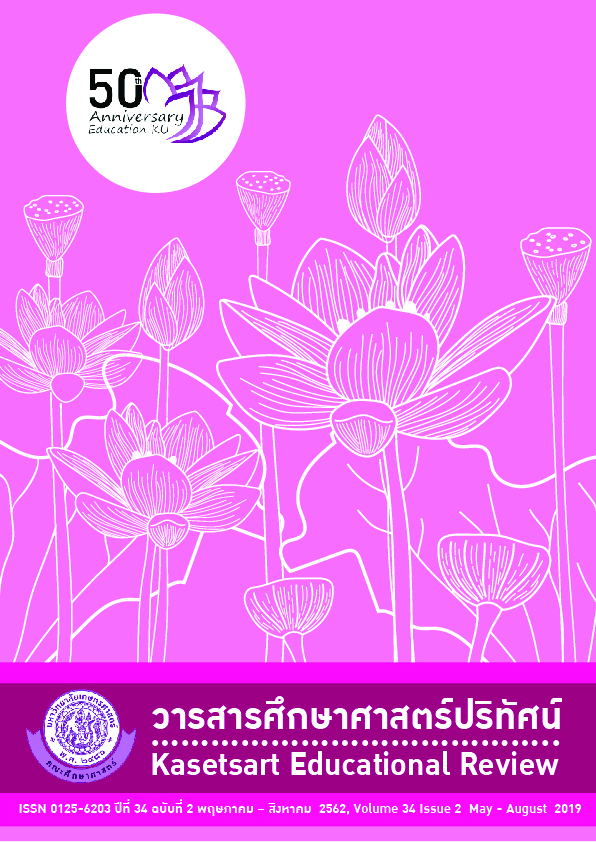การพัฒนาผลสัมฤทธิ์ทางการเรียนและการสร้างคําอธิบายเชิงวิทยาศาสตร์ เรื่อง ของไหล สําหรับนักเรียนชั้นมัธยมศึกษาปีที่ 6 โดยการจัดการเรียนรู้แบบใช้บริบทเป็นฐาน
คำสำคัญ:
การเรียนรู้แบบบริบทเป็นฐาน, การสร้างคำอธิบายเชิงวิทยาศาสตร์, ผลสัมฤทธิ์ทางการเรียน, ความพึงพอใจบทคัดย่อ
งานวิจัยในครั้งนี้มีวัตถุประสงค์เพื่อ 1) พัฒนาผลสัมฤทธิ์ทางการเรียน เรื่อง ของไหล สำหรับนักเรียนชั้นมัธยมศึกษาปีที่ 6 โดยการจัดการเรียนรู้แบบใช้บริบทเป็นฐาน 2) พัฒนาความสามารถในการสร้างคำอธิบายเชิงวิทยาศาสตร์ เรื่อง ของไหล สำหรับนักเรียนชั้นมัธยมศึกษาปีที่ 6 โดยการจัดการเรียนรู้แบบใช้บริบทเป็นฐาน และ 3) ศึกษาความพึงพอใจของนักเรียนชั้นมัธยมศึกษาปีที่ 6 ในการเรียน เรื่อง ของไหล โดยการจัดการเรียนรู้แบบใช้บริบทเป็นฐาน โดยกลุ่มตัวอย่างที่ใช้ในการศึกษาครั้งนี้ คือ นักเรียนชั้นมัธยมศึกษาปีที่ 6 แผนการเรียนวิทยาศาสตร์-คณิตศาสตร์ โรงเรียนฤทธิยะวรรณาลัย เขตสายไหม กรุงเทพมหานคร สำนักงานเขตพื้นที่การศึกษามัธยมศึกษาเขต 2 โดยมีนักเรียนจำนวนทั้งสิ้น 48 คน และเป็นห้องที่อยู่ภายใต้การรับผิดชอบของผู้วิจัย ระยะเวลาที่ใช้ในการทำการวิจัยจำนวน 18 คาบ ครอบคลุมแผนการจัดการเรียนรู้ทั้งหมดจำนวน 8 แผน เครื่องมือที่ใช้ในการวิจัยประกอบด้วย 1) แผนการจัดการเรียนรู้โดยใช้บริบทเป็นฐาน 2) แบบทดสอบวัดผลสัมฤทธิ์ทางการเรียน เรื่อง ของไหล และ 3) แบบวัดความพึงพอใจของนักเรียนชั้นมัธยมศึกษาปีที่ 6 ในการเรียน เรื่อง ของไหล โดยการจัดการเรียนรู้แบบใช้บริบทเป็นฐาน วิเคราะห์ข้อมูลด้วยสถิติค่าเฉลี่ยร้อยละ ค่าส่วนเบี่ยงเบนมาตรฐาน สถิติทดสอบค่าที (t-test) และคะแนนพัฒนาการสัมพัทธ์ ผลการวิจัยพบว่า 1) ผลสัมฤทธิ์ทางการเรียนเรื่อง ของไหล สำหรับนักเรียนชั้นมัธยมศึกษาปีที่ 6 หลังการจัดการเรียนรู้สูงกว่าก่อนได้รับการจัดการเรียนรู้แบบใช้บริบทเป็นฐานโดยมีผลต่างของคะแนนเฉลี่ยเท่ากับ 15.95 2) คะแนนพัฒนาการสัมพัทธ์ในการสร้างคำอธิบายเชิงวิทยาศาสตร์ของนักเรียนชั้นมัธยมศึกษาปีที่ 6 หลังจากได้รับการจัดการเรียนรู้แบบใช้บริบทเป็นฐานมีคะแนนเฉลี่ยร้อยละ 66.05 มีพัฒนาการอยู่ในระดับสูง และ 3) ความพึงพอใจของนักเรียนชั้นมัธยมศึกษาปีที่ 6 ที่ได้รับการจัดการเรียนรู้แบบใช้บริบทเป็นฐานมีความพึงพอใจอยู่ในระดับมาก
เอกสารอ้างอิง
Bloom, Benjamins. (1976). Human Characteristics and School Learning. New York : McGraw-Hill Book Company.
Beyer, C. J. and Davis, E. A. (2008). “Fostering Second Graders’ Scientific Explanations: A Beginning Elementary Teacher’s Knowledge, Beliefs, and Practice”. The Journal of the Learning Sciences. 17 (3) : 381-414.
Chmsaeng, T. (2017). The Development of Grade 10 Students, Scientific Explanation Ability in Equilibrium Unit Using Context-Based Approach. Master Degree thesis of Department of Education, Kasetsart University. (in Thai)
Gilbert, J. K. (2000). Explanation with Models in Science Education. In Gilbert, J. K. and Boulter, C. J., Developing Models in Science Education, Netherlands: Kluwer Academic Publishers. 193-208.
Gilbert, J. K. (2006). On the nature of “Context” in chemical education. International Journal of Science Education, 28(9), 957-976
McLellan, H. (1996). Situated learning Perspective.USA: Education Technology Publictions, Inc.
McNeill, K. L. and Krajcik, J. S. (2006). “Supporting Students’ Construction of Scientific Explanation through Generic versus Context-Specific Written Scaffolds”. Paper presented at the annual meeting of the American Educational Research Association, San Francisco, April, 2006.
Ministry of Education. (2017). Basic Education Curriculum 2008 (Revised Edition 2017). Bangkok : Kurusapa Printing Ladphrao. (in Thai)
Office of the National Education Commission. (2003). National Education Act B.E. 1999 and Amendments. Bangkok: Kurusapa Printing Ladphrao. (in Thai).
Organization for Economic Co-operation and Development. (2009). PISA 2009 Assessment Framework: Key competencies in reading, mathematics and science. Retrieved from https://www.pisathailand. ipst.ac.th.
Osborne, J. (2005). The Role of Argument in Science Education. In Boersma, K. et al., Research and the Quality of Science Education, Netherland: Springer, 367-380.
Panphum, T. (2017). The Effects of Context-based Learning with Journal Writingon Ratio, Proportion and Percentage toward Mathematical Achievernent and Learning Happiness of First Year Vocational Certificate Students of Thonburi Commercial college.Journal of Nakhonratchasima College, 11.
Pharmchu, J. (2010). Development of Grade-11 Students, Understandings About Rate of Reaction and Attitude Toward Learning Chemistry by Using Context-Based Learning Activities. Degree Thesis in Science Education, Kasetsart University. (in Thai)
Pitiporntapin, S. (2015). Management of science and society in the 21st century. Bangkok: Neva Education Limited Publisher: 35
The Institute for the Promotion of Teaching Science and Technology. (2015). PISA 2015 Basic information summary (IPST). Retrieved from https://www.pisathailand.ipst.ac.th
Thongnoy, N. (2017). Enhancing Grade 10th students, Scientific Explanation Ability in Ecosystem Learning Unit Using Socioscientific Issue-based Teaching.Master Degree thesis in Education Science of Department of Education, Kasetsart University. (in Thai)
Ummels, M. H. J., Kamp, M. J. A., de Kroon, H. & Boersma, K. Th. (2015). Designing and Evaluating a Context-based Lesson Sequence Promoting Conceptual Coherence in Biology. Journal of biological education, 49(1), 1-15.
ดาวน์โหลด
เผยแพร่แล้ว
ฉบับ
ประเภทบทความ
สัญญาอนุญาต
บทความทุกบทความเป็นลิขสิทธิ์ของวารสารคณะศึกษาศาสตร์ มหาวิทยาลัยเกษตรศาสตร์ วิทยาเขตบางเขน
วารสารศึกษาศาสตร์ปริทัศน์ (Kasetsart Educational Review)






